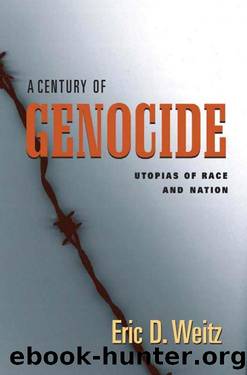A Century of Genocide: Utopias of Race and Nation by Weitz Eric D

Author:Weitz, Eric D. [Weitz, Eric D.]
Language: eng
Format: epub
Tags: History, Modern, 20th Century
ISBN: 9780691122717
Google: QkNtmAEACAAJ
Publisher: Princeton University Press
Published: 2005-01-23T06:35:47.473393+00:00
fi v e
â
â
â
â
National Communism:
Serbia and the Bosnian War
Dusko TadiÄ was born in 1955 in the Bosnian town of Kozarac. His family was of Serbian background and well-respected around town. His father was a decorated war hero from World War II. TadiÄ had opened a café in Kozarac that both Muslims and Serbs frequented. The town was heavily Muslim, and TadiÄ claimed that most of his friends were Muslim.
But in 1990 he joined the Bosnian Serb nationalist party, and, increasingly, Serb nationalists gathered at his café. They dressed in Serb nationalist coats, sang Äetnik songs, and gave the three-finger Serbian salute.
They were well armed and were heard to say things like âWe are going to kill all of the balijas,â a derogatory term for Muslims. As the situation in Bosnia deteriorated, TadiÄ joined the Bosnian Serb Army and in 1992 served in the Prijedor region and at the Omarska and other concentration camps. There he delivered the most severe beatings to Muslim prisoners, often with an almost indescribable brutality. For these actions, TadiÄ was indicted by the International Criminal Tribunal for the Former Yugoslavia, established by the United Nations Security Council in May 1993. His was the first trial held, and in 1997 he was found guilty of crimes against humanity, war crimes, and other charges.1
Like so many other Serb nationalists, TadiÄ had lived an apparently normal life. But when Yugoslavia began to disintegrate, he sided with the Serbian cause. Whatever violent tendencies he might have had were now given free reinâand political direction. The Serb regime in Belgrade and in Bosnian Serb territory actively encouraged the exercise of utter brutality against Muslims and Croats. In the drive to establish a completely homogeneous and âpureâ Serbian state and society, nationalists adopted the most violent methods designed to make a multinational society unthinkable and, finally, unbearable.2
s e r b i a a n d t h e b o s n i a n wa r â 191
POWER AND UTOPIA
At first glance, Serbia evinces little of the revolutionary élan that characterized the Russian Revolution, the Nazi seizure of power, and the Khmer Rouge victory. There seem to have been no revolutionary heroics, nothing like the storming of the Winter Palace; the torchlight parade of thousands upon thousands of proud, disciplined Storm Troopers the day after Hitler was named chancellor; or the enthusiastic shooting in the air by troops who, after years of hard struggle in civil war, had finally taken Phnom Penh. The confidence that gripped the followers of the revolution in each of these cases, the sense that they were marching with History and were on the cusp of creating the new society, marked by unbounded prosperity and happinessâall that seems noticeably absent in Serbia, which appears, instead, to have undertaken in the late 1980s and 1990s a bumbling, cynical, and desultory march into war, ethnic cleansing, and genocide. Indeed, as Carla del Ponte, the chief prosecutor of the International Criminal Tribunal, stated as she launched the case against Slobodan MiloÅ¡eviÄ
Download
This site does not store any files on its server. We only index and link to content provided by other sites. Please contact the content providers to delete copyright contents if any and email us, we'll remove relevant links or contents immediately.
| Civilization & Culture | Expeditions & Discoveries |
| Jewish | Maritime History & Piracy |
| Religious | Slavery & Emancipation |
| Women in History |
Cecilia; Or, Memoirs of an Heiress — Volume 1 by Fanny Burney(32548)
Cecilia; Or, Memoirs of an Heiress — Volume 2 by Fanny Burney(31947)
Cecilia; Or, Memoirs of an Heiress — Volume 3 by Fanny Burney(31932)
The Secret History by Donna Tartt(19058)
Sapiens: A Brief History of Humankind by Yuval Noah Harari(14370)
Leonardo da Vinci by Walter Isaacson(13318)
The Radium Girls by Kate Moore(12018)
Sapiens by Yuval Noah Harari(5366)
How Democracies Die by Steven Levitsky & Daniel Ziblatt(5216)
The Wind in My Hair by Masih Alinejad(5092)
Homo Deus: A Brief History of Tomorrow by Yuval Noah Harari(4909)
Endurance: Shackleton's Incredible Voyage by Alfred Lansing(4769)
Man's Search for Meaning by Viktor Frankl(4585)
The Silk Roads by Peter Frankopan(4526)
Millionaire: The Philanderer, Gambler, and Duelist Who Invented Modern Finance by Janet Gleeson(4469)
The Rape of Nanking by Iris Chang(4203)
Joan of Arc by Mary Gordon(4101)
The Motorcycle Diaries by Ernesto Che Guevara(4089)
Stalin by Stephen Kotkin(3957)
